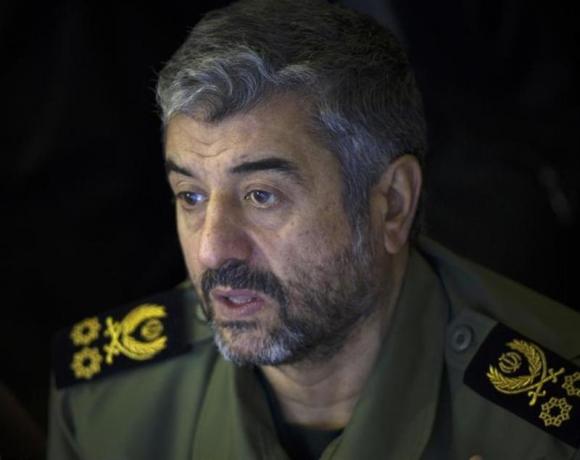December 20-2013

. . . on defensive
Foreign Minister Mohammad-Javad Zarif has greatly upset the armed forces by saying they don’t scare the Americans one bit.
The military has now gone on a feverish campaign to counter Zarif and restore their propaganda initiative to make the Iranian public believe that Washington quakes in its boots at the mere thought of the Iranian military.
In a speech earlier this month at the University of Tehran, Zarif said the Iranian military doesn’t frighten the United States at all. “Do you think that America, who can paralyze our entire defensive system with a single bomb, fears our defense system?”
Zarif later gave the standard retort, contending that he had been misquoted. But no one believed that, least of all in the armed forces, where the generals continue to snarl and denounce Zarif for talking about things he doesn’t understand.
Zarif has declined to join in a general brawl and contends that what he really said was that the American military was frightened by the dedication to resistance of the Iranian people and that is what has stopped the Americans from invading.
Major General Mohammad Jafari, the commander of the Pasdaran (Revolutionary Guards) has mobilized every argument he could find in response to Zarif, whose remarks seem to have struck a chord with many Iranians.
In one response, Jafari criticized the government of President Rohani as being under the influence of Western ideas, a sure sign that an effort at a direct factual response wasn’t working.
“The systems and procedures governing the administrative system of the country are the same as before, [but they] have been slightly modified and unfortunately infected by Western doctrine, and a fundamental change must occur,” Jafari said last week.
At one time, the Iranian military boasted that it would smash the Americans if they ever invaded. It announced that it was digging 300,000 graves for the Americans it would kill—and even produced a photo of rows of dozens of empty holes dug in the ground for coffins. But the regime dropped that line a few years ago, apparently after polls showed that the Iranian public was not impressed by such talk about a military that demolished the Iraqi armed forces in one month although Iran failed to so in eight years.
The military then shifted to an argument that the Americans were too fearful of casualties they would face in Iran and had therefore given up any thought of an invasion and instead had launched a “soft war” against Iran, trying to cripple the country by undermining its political system and promoting dissent.
Last week, Jafari returned to that theme. “The main threat to the revolution is in the political arena and the Pasdaran cannot remain silent in the face of that,” he said.
Siavush Ranjbar-Daemi, a lecturer in Iranian politics at Manchester University in Britain, said there is much more to what is going on than mere rhetorical competition.
He told Reuters, “From the moment this presidency started, Rohani has been trying to redefine the Pasdar presence in politics. He sees them as obstacles to the nuclear agreement.
“He’s trying to acquire as much influence as possible over [Supreme Leader Ali] Khamenehi. Clearly the relationship between Rohani and the Pasdaran is not good. There will be a lot of adjustments and turf war.”
Jafari also chastised Foreign Minister Zarif for not having expertise in military matters.
“We consider him an experienced diplomat, but he has no experience in the military field,” Jafari said.
In an appearance at Tehran’s Imam Sadeq University, Jafari was answering a question about whether US forces could destroy Iran’s military capability with just a few bombs, as Zarif had said.
“It’s not like that at all. He has no military experience or expertise,” Jafari snapped.
Jafari also took on Zarif’s clearly hyperbolic claim the US could put Iran out of action “with a single bomb.”
Jafari said, “If today, the enemy … strikes us with thousands of bombs in a large number of sorties, only 10 to 20 percent of the Pasdar missiles might be destroyed. Our military might is not limited to missile capability, for we are a strategic power for the ruling system.”
The US military is very concerned by Iran’s missiles—if they are ever topped with nuclear warheads. But no one worries much about inaccurate ballistic missiles with only conventional warheads.
Jafari boasted that Israel is within range of Iran’s missiles, but he did not tell the public that Saddam Hussein fired 39 missiles at Tel Aviv in 1991 and only killed two people because the missiles were so inaccurate.
But Jafari slipped back into the boastful remarks about Iranian might that officers had tried to mute in recent years. Jafari said Israel and the United States are incapable of taking military action against Iran. He called President Obama’s frequent reference to the military options on the table “ludicrous,” saying, “Repetition of such an absurd sentence by the officials of the United States and the fake and evil Zionist regime sounds funny to the Iranian people.”
He said that if the Americans ever adopted “stupid measures,” that would compel Iran to consider the options it has on the table. “Lots of options are on the table for Iran and they will receive crushing blows, one of which would be elimination of the Zionist regime.”
His clinching argument was that it was the power and might of the Iranian armed forces that forced the Big Six powers to sit down and deal with Iran as an equal. “The factor that led our enemies to come to the negotiating table was our security and defense capabilities, which I hope will be safeguarded [at the talks].”
Brig. Gen. Mohammad-Reza Naqdi, the commander of the Basij forces, went further than Jafari, proclaiming. “The might of the Iranian armed forces is unbelievable since they have a huge volume of equipment, much of which the enemy knows nothing about.”
In his speech at the University of Tehran, Zarif made some other points that got lost in the controversy set off by his dismissal of Iranian military power.
One major point was a caution to the students that all Iranians need to shed what he called the Cold War mentality of confrontation. He said the old world of superpowers is waning and a new world is emerging that will require a more sophisticated and nuanced approach to the world. He said that “middle powers like us” will have vast opportunities in the new world now emerging and will be able to promote their national interests only if they understand how to do deals in that new world.
























